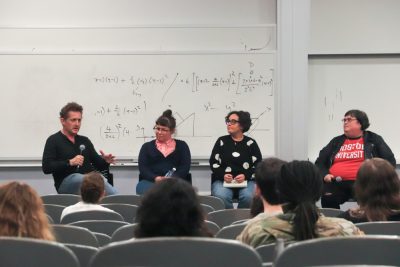The boom of digital advancements in the last couple of decades has left many wondering if society is going in the right direction. This debate has inspired Director Alex Winter’s work immensely, as he hopes to explore the ups and downs of the modern digital age.
He brought his documentary “The YouTube Effect” to screen at the Boston University College of Communication on Wednesday. The event, hosted by COM, featured a screening of the documentary followed by a panel discussion with Winter and other digital media experts.

“The YouTube Effect” examines how YouTube, the second most popular website in the world, has impacted global culture to both rewarding and damaging ends since its inception in 2005. The film is the latest of Winter’s documentaries exploring the complexities of the digital world. His other films include “Trust Machine: The Story of Blockchain,” which explores the origin and evolution of cryptocurrency, and “Downloaded” (2013), about Napster and the digital revolution.
In “The YouTube Effect” and his discussion surrounding it, Winter emphasized that he is not anti-YouTube. He said he is in fact “a big proponent of technology,” but that people should be more aware of the issues it creates.
Winter said YouTube in particular functions as more than just a social media site.
“It is a media platform,” he said. “It is news, it is search, it is entertainment, it is music. It is also the largest repository of human media that exists or has ever existed.”
“The YouTube Effect” maps the evolution of the media giant from its early beginnings, from the jovial nature of early virality to the very real and dangerous dispersion of hate speech. The documentary explores the nuances of YouTube and what lies in its future depending on how Google, its parent company, addresses these issues.
The documentary features interviews with YouTube co-founder Steve Chen, former CEO Susan Wojcicki and content creators including Anthony Padilla of SMOSH and the Kaji family behind the wildly successful channel Ryan’s World.
BU is Winter’s latest stop on his worldwide university tour for the documentary. He said YouTube impacts young people the most because they use the platform so frequently and hopes that showing his documentary at universities will engage with college-aged audiences.
Winter said he has found that college students are aware of the issues that YouTube brings and have been receptive to the film.
“A lot of young people are actually very well aware of the problem because they’re online a lot,” Winter said. “They’re not ignorant at all. They’re actually more well versed in this area than most people are.”
Winter said the post-film Q&A focused on “talking to both experts and students about the issues.”
Panelists included Joan Donovan, a COM assistant professor who specializes in disinformation and media manipulation, Gabriella Coleman, an anthropology professor at Harvard University who studies digital culture and cyberpolitics, and Eleni Castro, BU’s director of digital ventures. Winter and the other panelists continued the conversations from the film and about YouTube as a whole by applying their various fields of research to students’ insights and questions.
Faith Caroll, a senior at Berklee College of Music who attended the event, said she feels the Q&A session provides a physical space to have a conversation about the film, rather than discussing it in a forum or comment section.
Grace Lumley, a senior in COM who attended the event, said connecting with a film’s creator through a Q&A is important to help students understand their work.
“Once you put something out into the world, everyone can interpret it how they want to,” Lumley said. “Having the creator there when you’re watching it gives you a more direct understanding of it.”
Winter said his experience showing “The YouTube Effect” to college students has made him hopeful about the future.
“I’m just really grateful that people have been coming out for it,” he said. “It gives you hope, knowing that people are so engaged with the issues at hand.”
























































































































